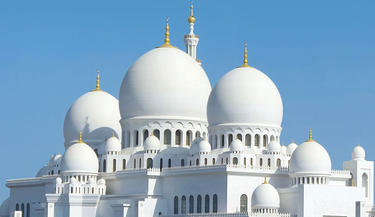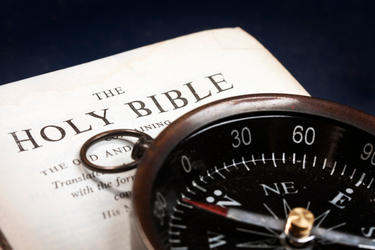What can we expect will happen as Islamists take charge in the nations of the Arab uprisings? Turkey and other experiments in Muslim democracy give us some precedent. And on the horizon, the Islamist dream looms—a restored empire of Islam. What does this mean for the future of the Middle East and the world?

The Sheikh Zayed Grand Mosque located in Abu Dhabi, United Arab Emirates.
Source: Thinkstock
Instead of a freedom-oriented Arab Spring, as cheery enthusiasts have hailed it in the face of toppled dictators, the Middle East is actually beset by a deepening Islamist winter (see "
Winter Advisory: The Arab Spring That Wasn't "— intended as a prelude to this article). Does this relate at all to Bible prophecy, and does Scripture indicate where these trends may be leading?
Of course, Islamist rule has a long history in the Middle East, going all the way back to Muhammad, founder of Islam, in the seventh century. He set the example of spreading his new religion by the sword, taking control of the entire Arabian Peninsula in the space of 10 years (622-632).
After his death, he was followed by other rulers called caliphs, from the Arabic
khalifah, meaning "successor" (to Muhammad) or "representative" (of Allah to mankind). And the caliph's dominion was known as the caliphate (Arabic
khilafa and Turkish
Hilafet ). Under the caliph, the dominion was governed by a religious hierarchy following Islamic law and jurisprudence—sharia.
After the first four Rashidun or "rightly-guided"caliphs, the caliphate passed to dynasties of rulers. The Ummayads (7th-8th centuries) and the Abbasids (8th-13th centuries) at their height ruled territory stretching from Spain all the way to India. The rival Shiite Fatimids (10th-12th centuries) took over much of the territory for a time.
Following the Mongol invasions from the east in the 13th century, the caliphate ceased to actually rule. But it was revived under the Turkish Ottomans when they took control of most Arab lands (16th-20th centuries).
After the fall of the Ottoman Empire at the end of World War I, Kemal Ataturk imposed a secularist state onto Turkey and dragged it into the Western sphere. Various kings and dictators took over the Arab states. These allowed principles of sharia as part of national rule to varying degrees, but not nearly to the satisfaction of most Muslims in the region. And in any case, they failed to all come together into a single
ummah (supranational community) under a single caliph.
Dreams of a restored caliphate
Since the Ottoman fall, many devoted Islamists have dreamed of reestablishing the caliphate. One such dreamer was the Egyptian Hassan al-Bannah, who in 1928 founded the Muslim Brotherhood, the organization that has benefited most from the Arab Spring uprisings. The caliphate's restoration remains the Brotherhood's goal.
Moreover, the caliphate has been a recurring theme in recent speeches of Islamist leaders. As pointed out in the companion article on the Arab Spring, one celebrated Brotherhood preacher claimed that the election of Mohamed Morsi as president in Egypt was prelude to a coming Islamic caliphate—a United States of the Arabs with Jerusalem as its capital. And Morsi then acknowledged that Jerusalem's conquest was indeed the goal.
Yet so many in the West can't fathom that such rhetoric is at all serious. They won't even accept that Morsi would rule as an Islamist hardliner despite his ramming through a sharia-based constitution, confident that he will conform to Egyptian politics as usual as the realities of governing set in.
Former U.S. federal prosecutor Andrew McCarthy comments on this notion in his new book
Spring Fever: The Illusion of Islamic Democracy:
"Then there are the eternal optimists who try to pass themselves off as hard-headed pragmatists. Their theory is that governing will make the ruler accountable to the public; consequently, the practical responsibilities of the offices to which they've been elected will tame Islamist politicians. They will evolve, coming to see that sharia and anti-Semitic, anti-Western animus are just not compatible with running a government in the modern world. Governing will transform them into moderates . . .
"[But] has Iran gotten more moderate over the last thirty years? Has Hamas's election in Gaza . . . helped that terrorist organization evolve? . . . The election of Islamic supremacists in Turkey has moved that country toward extremism, not away from it"(2013, p. 19).
Indeed, Turkey and other recent attempts at democracy in the Muslim world give us indications of developments that will follow elections of Islamists into power in Arab nations. Furthermore, as we will see, Bible prophecy also shows where events are headed. Will they end in a restored caliphate? Or will freedom come to the Middle East at last?
"The Turkish Model"
We should give some consideration to Turkey, as it's looked at by many in the West as a model for the Arab world—"the Yellow Brick Road to the sparkling Oz of 'Islamic Democracy'"(p. 75). U.S. President Barack Obama cherishes his friendship with Turkish Prime Minister Recep Tayyip Erdogan—his go-to counterpart in the Middle East, whom he has looked to for advice on regional issues, including the Arab Spring.
The problem in seeing Turkey as such a model is that its tradition of democracy has nothing to do with Islam. Just the opposite, Kemal Ataturk made Turkey a secular state, although the population remained predominantly Muslim.
Erdogan, on the other hand, is an Islamist —"a Muslim Brother who drank deep the lessons of the master, Hassan al-Banna"(p. 2). Since he became prime minister in 2003, a year after his Islamist "Justice and Development Party"(AKP in Turkish abbreviation) came to power, Erdogan has been leading Turkey
away from democracy.
For the West and concerned secularists in his own country, Erdogan has sometimes presented himself as upholding secularism while merely allowing Islam free expression in the public sphere. But this is a man who in 1998, four years prior to his party's takeover, said effectively, "Democracy is just the train we board to reach our destination."
And what destination is that? Perhaps his words that followed, adapted from a nationalist poem, provide a clue: "The mosques are our barracks, the domes our helmets, the minarets [mosque towers] our bayonets and the faithful our soldiers."
Of course, returning Turkey to the Islamist camp has not been an overnight task—though it has proven far easier than it was for Ataturk to impose secularism. It was a split in Turkey's non-religious parties that allowed the AKP to take over parliament with just a third of the popular vote. Yet in the decade since, Erdogan has managed to play his hand well at several turns, at length overcoming the Kemalist "deep state,"the inner sanctum of state officials with military backing that long maintained the secular order against Islamist ingress.
A slow Islamist takeover of Turkey
So where is Turkey today? Erdogan has focused on education promoting Islamic principles, his AKP party moving to establish many new universities with Islamist leaders—part of an effort to reshape the culture.
Furthermore, notes McCarthy: "The prime minister also moved to lower the mandatory retirement age for various categories of government technocrat . . . [which] enabled the Islamists to depose incumbents from thousands of positions—including over 40 percent of the republic's 9000 judgeships.
"In their place, adherents of the AKP's Islamist ideology were installed. Meantime, to degrade further the judiciary's vital role in upholding the secular order, Erdogan refused to enforce judicial rulings and threatened to abolish the Constitutional Court, a key component of the deep state"(p. 80).
Turkey is now ranked as the world's worst jailer of journalists—with scores imprisoned, some sentenced to as many as 166 years. And things have definitely worsened under sharia's repression of women in the country:
"As female employment craters, the rate at which women are murdered has zoomed by
1400 percent. In 2002, when the AKP was first elected, there were sixty-six reported cases of 'honor killings'—murders of women and girls at the hands of family members who consider themselves shamed when sharia norms were violated. In just the first seven months of 2009, the number was 953"(p. 83, emphasis in original).
On the foreign policy front, Erdogan has cut off longstanding ties with Israel, accusing the Israelis of state terrorism. Meanwhile he has embraced Iran (as has Egypt's President Morsi). And the Turkish leader has even offered himself as a character witness for Sudanese President Omar al-Bashir, indicted for international war crimes because of his ethnic cleansing campaign in Darfur—Erdogan stating that "a Muslim can never commit genocide."
He's even had Turkey donate hundreds of millions of dollars to the government of Gaza, ruled by the terror group Hamas. "That is to say, Turkey is now bankrolling Hamas. Erdogan has taken his country from NATO ally to terror sponsor"(p. 116).
Do we imagine better for Egypt and the other Arab Spring countries where Islamists have gained power? If anything, it will be far easier to impose Islamic rule on these countries accustomed to authoritarian rule and sharia principles than it has been for Erdogan to transform Turkey from its decades of secular democracy.
Iraqi and Afghan forays into democracy as preview
Perhaps more closely paralleling the Arab Spring countries are the two countries the United States and other Western nations liberated from dictatorial rule and turned over to new constitutions and democratic processes. How has that worked out?
These are now, as McCarthy puts it, "a pair of sharia states hostile to American interests (Iraq is an Iranian satellite; Afghanistan verges on a Taliban re-conquest), to go along with a regional cavalcade of jihadists and totalitarian Islamists, now swaddled in sovereign legitimacy thanks to the subordination of democratic
culture to democratic
procedures —as if electing a class president somehow made the third grade a 'democracy' and the schoolyard bullies a 'political party'"(p. 41, emphasis in original).
U.S.-backed Afghan President Hamid Karzai has even suggested that Mullah Omar, the Taliban leader formerly ousted from power by the U.S. invasion, run for president in the next election!
We should also consider the plight of Christians. In the past few years, thousands of Christians have been murdered in Iraq, and hundreds of thousands more have fled to other countries in fear.
In Afghanistan, the United States twice had to exert great pressure to whisk away individuals who were to be
executed for converting from Islam to Christianity—one of them released on the pretext that he was "not of sound mind"(for what else would a person who leaves Islam be?). In Egypt, according to a 2011 Pew survey, 84 percent of the people want the death penalty imposed for those abandoning Islam—
84 percent! The percentage is quite high in other Muslim countries as well.
And how's this for women's rights under sharia in Afghanistan? "At the end of 2011, Karzai's office announced that the president had magnanimously commuted the prison sentence of a nineteen-year-old woman who was serving a twelve-year term imposed by an Afghan court after she was convicted of . . . having sex out of wedlock . . .
with a relative who had raped her. Karzai's rationale for the pardon? The woman had cured her indiscretion by agreeing to marry the rapist, whose child she had borne during her jail term"(p. 47, emphasis in original).
Such is the outcome of democracy in nations where those desiring the imposition of Islamist rule are in the majority. And appallingly the West, including the United States, has advocated for and continues to support this outrage. (See "
Puzzling U.S. Support for Islamists Over Moderates ".)
What's to follow?
So, what can we expect will now follow? Certainly, the fallout from the Arab uprisings is still ongoing. Expect a tightening of sharia's grip in Egypt and throughout the Arab world and in other Muslim nations—and more misleading assurances from Western leaders and media that there's no cause for concern.
Also look for further conflagration where revolution has not stabilized. With Libya awash with weapons and many flowing to neighboring countries, al-Qaeda in North Africa and other terrorists have been strengthened.
The French intervened in Mali in January 2013 to prevent terrorists from taking complete control there after they had already overrun much of the country. And following the many people killed at the end of the Algerian hostage crisis just after, British Prime Minister David Cameron said that the Islamist threat in this region requires "a response that is about years, even decades, rather than months."
Furthermore, there is the grave danger of chemical weapons being unleashed by Bashar al-Assad in Syria as he struggles to survive. Yet others worry over Assad being toppled by the jihadists allied against him and his chemical weapons and the rest of his vast arsenal falling into terrorist hands.
The spreading Islamist revolution
What about the Arab monarchies, such as Jordan and Saudi Arabia? So far they've remained secure against the Arab uprisings. But the Muslim Brotherhood is agitating in these countries to spread the revolution. Numerous analysts believe they will be next to fall.
Lebanese-born author and commentator Brigitte Gabriel said in December that despite claims that U.S. Special Operations troops are stationed in Jordan over concern about what's happening in Syria, "the truth is that our Special Ops [personnel] are positioned in Jordan to protect King Abdullah, because King Abdullah right now has only two-percent approval in his country. The majority of people would vote the Muslim Brotherhood if elections are held in Jordan today"(quoted by Chad Groening, "Prediction: Jordan the Newest 'Arab Spring' Addition,"OneNewsNow.com, Dec. 11, 2012).
Elections
were held in Jordan in January, but the Muslim Brotherhood boycotted them because electoral rules favor the monarchy. Of course, the Brotherhood will continue to press for changes that would allow its candidates to prevail.
Among the Palestinians, it appears a rapprochement is coming between the rival factions of Fatah and Hamas, but rapprochement with the Israeli Jews is out of the question. In line with recent Muslim Brotherhood calls in Egypt, the Palestinian Chief Islamic Judge Tayseer Al-Tamimi said this on Dec. 31, 2012:
"The caliphate will be restored after this tyrannical rule [by Israel] comes to an end. This is already the beginning of the end for the tyrannical rule. The Arab revolutions against injustice, tyranny, and oppression will bring its end, and the caliphate will be restored. What we are seeing in Egypt are birth pangs. The struggle between Islam and others, and all the conspiracies that aim at stopping the train that has already set out to liberate Jerusalem and to restore Islamic rule. Jerusalem will be the capital of the caliphate, Allah willing"(posted at the Middle East Media Research Institute [MEMRI] website, Jan. 7, 2013).
This echoes Erdogan's earlier mention of democracy as the train to reach the Islamist destination. And the ultimate destination is indeed a restored caliphate on its way to taking over the world. With the rate at which things are moving, perhaps the train is not too far from the station.
Clues from Bible prophecy
Bible prophecy does appear to tell us, in Psalm 83, that the world will see a confederation of Middle Eastern peoples intent on wiping out Israel—which will evidently involve the Arabs, the Palestinians, the Turks and others in the region.
Daniel 11 similarly speaks of an end-time "king of the South"who will reignite the age-old struggle against a power to the north—centered in Europe since Roman times—with the land of Israel caught up in between. This will provoke a retaliatory war resulting in the European occupation of many Middle Eastern lands, including Israel. (See "
Israel: A Nation in Constant Peril " to learn more.)
The confederation and southern power in these prophecies could well be a restored Islamic caliphate, which now seems to be on the rise—although this is not a specific biblical requirement. The Bible mentions only the people and lands involved, not their governance. But given who and where these people are, Islam seems the most likely factor in their cohesion. It is certainly today's most powerful driving force in the region—and has been so for more than 13 centuries.
Some analysts in assessing the near future see the Islamization of the Middle East as almost inevitable. Given the failure of military dictatorships, Islamic rule beckons as a promising ideal for many Muslims. It seems they will have to live under its crushing boot to get it out of their systems, as many in Iran now have (though the Islamists maintain control there). Yet this will not really be enough to free the people, as vast numbers will not recognize their own plight, being enslaved to wrong thinking.
The long winter will cease
On Palestinian television Dec. 2, 2012, the wife of a Hamas parliament member told an interviewer regarding a woman's role in that culture: "She instills in her children the love of Jihad and martyrdom for the sake of Allah. If every mother were to prevent her son from waging Jihad for the sake of Allah, who would wage Jihad? Who would support Palestine?
"Palestine is dear to us, and its price is paid with our body remains and our lifeblood . . . I am constantly praying: 'Allah, make the end of our days be in martyrdom.' I pray for this even for my husband and my children. None of us want to die in our beds. We pray that Allah will grant us Paradise" (posted at MEMRI).
This is dumbfounding and heartbreaking —and devastating to any notions of freedom in the Islamist-dominated Middle East. How does one reason or negotiate with this conviction held by millions of people? It is not rational but is the product of generational programming and outright demonic deception and influence on a colossal scale.
The fact is, something monumentally earthshaking must break this evil hold on people's minds to truly set them free. And rest assured, something will.
As the Bible foretells, unimaginable cataclysm will engulf the world, and people will suffer under tyranny as never before. Then,
Isaiah:19:20-21 tells us, the people of Egypt "will cry to the Lord because of the oppressors, and He will send them a Savior and a Mighty One, and He will deliver them. Then the Lord will be known to Egypt, and the Egyptians will know the Lord in that day."
In that day, Egypt will finally be at peace with Israel (verses 24-25). Yes, at long last Jesus Christ will come to save the Egyptians and all humanity—and all will come to know the true God.
The truth is that
all have been slaves to wrong thinking to varying degrees. In that day, deception will be lifted and ancient hatreds will cease. The devil and his minions will be banished, and peace will reign under the wonderful Kingdom of God. At the end of man's perpetual winter, the springtime of the genuine paradise of God awaits. May it come swiftly!




